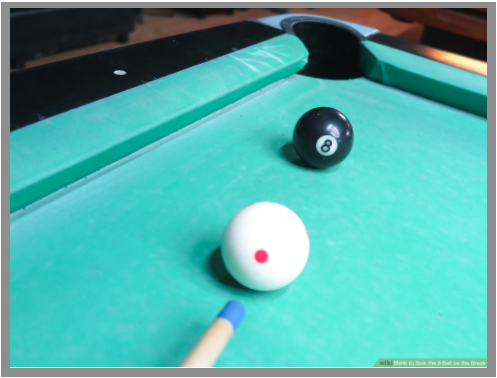Introduction
We make a lot of decisions in our life–from what to get for dinner to which career to pursue. Even the smallest of the decisions (like choosing to do a quick stretch) is what consists of our everyday life. We often believe that we are in control of our own actions, and as a result, it is commonly accepted that there are “good” and “bad” decisions in life and that we are the ones accountable for our own such decisions. These beliefs naturally led to conclusions such as praising successful people and punishing criminals, but there is one important question we need to ask ourselves first: do we actually have the ability to make our own decisions? The answer might be unclear, but many physicists lean toward…no.
Background
Before we dive deeper into the topic, let’s quickly talk about some physics…and 8 ball! So imagine this situation: there is a ball in the center of the table, a hole we aim to get it into, and a renowned physicist, Bob. If we hit the ball precisely according to Bob’s calculations, will we be able to reliably get our ball in the hole? Well, of course, the answer is clear–the ball will go in every time since the ball, as all objects do, obeys the rules of physics (and assuming that Bob is right!) What if we now increase the scale just a little bit–instead of hitting the ball directly, we need to hit a different ball to indirectly get our original ball in.
Well, even in this case, Bob will still be able to calculate a way to get the ball in, and it will work 100% of the time if properly carried out. The point being, no matter the scale, we are able to predict the outcome of any given 8-ball shot as long as we know its initial variables such as velocity, mass, and position since all movements that will happen on the table are direct mechanical consequences of hitting the first ball. This concept might sound obvious, but having this in mind will help us get to our next topic.

Laplace's Demon

Enter Pierre-Simon Laplace, a French scientist who proposed an interesting thought experiment: The Laplace’s Demon. Just like its name, the idea that Laplace promoted is very cool; he proposed that if there existed a demon (or any life form) that could observe the position and velocity of all particles in the universe at a given instant, it would be able to see the past and predict the future. Sounds vague? Well, the idea behind this is simply an extension of the concept we discussed earlier. Just like how we were able to calculate the outcome of any 8-ball shot, Laplace stated that we could, in theory, calculate the outcome of the universe; it’s just that instead of billiard balls and a table, he used atoms and the universe as his canvas. In other words, since all matter in the universe is made up of the 24 fundamental particles, and since they all interact in completely predictable ways, the universe is also completely predictable!
This theory–often referred to as determinism or mechanism–actually has a long history before Laplace promoted it in the 19th century. In fact, one of the earliest records of it comes from Cicero, an ancient Greek Philosopher that lived 2000 years ago:
Free Will
The implication of the theory of determinism is that humans actually lack free will because we, too, are made entirely of only the fundamental particles. There is no distinction between the atoms itself that make up our living body and that of which makes up a corpse. As such, it is meant that we are not exempt from the laws of physics and thus our actions are entirely predictable and predetermined.
There is one interesting thing about this discussion though, and it is that whether if the theory of determinism was true or not, it does not have any impact on how we should live. If it was false, well, we keep on living as we do now, and if it was true, there is no use thinking about it; you will not be able to escape the realm of determinism and the series of predetermined events anyways. However, note that this notion does not imply that effort is useless. It is not the future result that is predetermined, but rather the path leading up to it. One is not simply predetermined to become great, but rather is predetermined to work hard to achieve their greatness.
At the end of the day, we’re better off thinking that free will does exist.
But you can’t deny it, it surely is an interesting subject to talk about!
For clarification:
- Some scientists argue that the universe (and thus our lives) is not predetermined due to the existence of randomness in the quantum world (hear more about this topic here: link)
- This is a popular and valid argument that undermines the theory of determinism. However, it does not support the existence of free will. Subatomic particles exhibit randomness under certain circumstances, but this does not mean that we are the ones choosing the outcomes. As far as human actions are concerned, randomness is effectively nonexistent.
[1] Wagenmakers, Eric-Jan. (2018). “Laplace’s Demon”. Bayesian Spectacles. https://www.bayesianspectacles.org/laplaces-demon/#:~:text=If%20this%20is%20true%2C%20Laplace,known%20as%20’Laplace’s%20demon’.. Last Accessed: 2020/08/18.
[2] Kastrup, Bernardo. (2020). “Yes, Free Will Exists – Just ask Schopenhauer”. Scientific American. https://blogs.scientificamerican.com/observations/yes-free-will-exists/#:~:text=At%20least%20since%20the%20Enlightenment,whether%20we%20have%20free%20will.&text=A%20common%20and%20straightforward%20view,free%20will%3B%20otherwise%20we%20do. Last Accessed: 2020/08/18.
[3] Veritasium. (2014). “What is NOT Random?”. https://youtu.be/sMb00lz-IfE. Last Accessed: 2020/08/18.
[4] [IMAGE] “How to make Difficult Decisions” Life Lessons. https://lifelessons.co/personal-development/how-to-make-difficult-decisions/. Last Accessed: 2020/08/18.
[5] [IMAGE] “How to Sink the 8 Ball on the Break”. wikiHow. https://www.wikihow.com/Sink-the-8-Ball-on-the-Break. Last Accessed: 2020/08/18.
[6] [IMAGE] “Laplace, Pierre-Simon, marquis”. Wikimedia Commons. https://commons.wikimedia.org/wiki/File:Laplace,_Pierre-Simon,_marquis_de.jpg. Last Accessed: 2020/08/18.
